The Open Notes Test: Increased Transparency Allows Patients to Monitor their Medical Records

For medical professionals, keeping patient records accurate and up-to-date can be challenging, especially with packed schedules and the countless aspects of patient health that need to be monitored. So, it’s no wonder that such records are rife with errors, whether it be drugs on the active medication list that haven’t been taken for years, a problem listed that never occurred in the first place, or the absence of important information regarding a procedure years before.
In April of 2021, the new federal Information Blocking rule — aptly dubbed “Open Notes” — was put into effect, making mandatory the release of 16 categories of electronic records to medical patients as soon as they are available. The rule allows patients to monitor their health records so that they might receive information quicker and, more importantly, so they can alert their health provider to any false, missing, or misleading information in their record.
Medical records are far from perfect.
One MedPage Today Article examined the reasons behind the rule’s implementation and the effects of the newly mandated practices for patients and medical professionals.
As the article explains, medical records contain mistakes more often than one might think. For example: a study published in The Journal of the American Medical Association (JAMA) last year surveyed patients who accessed their medical records online, asking them to report any errors and describe the nature of those errors.
The study revealed that 21% of participants found a mistake in their medical record, and 42% of that group thought the error was serious. Errors were not isolated to one area, however — among the responses were reports of records including the wrong patient, wrong body part, wrong side, and excluding the reason for visit entirely.
Two other studies further corroborated such findings — but why all the mistakes? As one physician explained, recordkeeping practices in the medical world often prioritize speed and efficiency over accuracy. For instance, doctors might copy notes from a colleague who treated the patient years earlier, and accidentally conflate old problems with new ones. Additionally, standard templates might fill in areas without direct confirmation of the doctor — for instance, confirming a pulse in the feet for a patient who is a bilateral amputee.
Ultimately, while some errors in recordkeeping could be relatively innocuous, the frequency and nature of such mistakes means that patients can be exposed to serious risk.
Errors on paper can lead to tragic outcomes.
The day one becomes a parent is a day that can never be forgotten. But the memories should be of inexplicable joy, and not heart-wrenching pain. However, an error in one’s medical record can lead to misinformed care that results in tragedy.
A mother with a history of chronic hypertension, or high blood pressure, relies on her medical providers to communicate about her prenatal care. However, if such a condition is not recorded accurately, she won’t get the special attention she needs during her pregnancy, which could lead to serious birth complications for her and her child.
A patient’s health should never be put at risk because of a typo, omission, or other error in their medical records. Such risks are avoidable, and even more so with the increased transparency that the Open Notes rule requires.
Patients know themselves best.
This doesn’t mean self-diagnosis is the answer. But it does mean that in a tangled web of communications, the best assurance of accuracy is empowering patients to access their own records in order to spot any mistakes. Months after the Open Notes rule was officially implemented, many practices still don’t provide the full transparency that the rule asks of them. As a result, the health of patients is still at risk.
We at The Eisen Law Firm have seen the dire outcome of incorrect medical records. We hope that the Open Notes rule will help curb the proliferation of potential errors in your medical record. It is a step in the right direction, especially if it is enforced. If you or someone you love were harmed by faulty practices or medical negligence, The Eisen Law Firm can help. Our experienced malpractice attorneys will talk through your options for legal action and for receiving the compensation you deserve. To schedule a free consultation, call 216-287-0900 or contact us online today.




